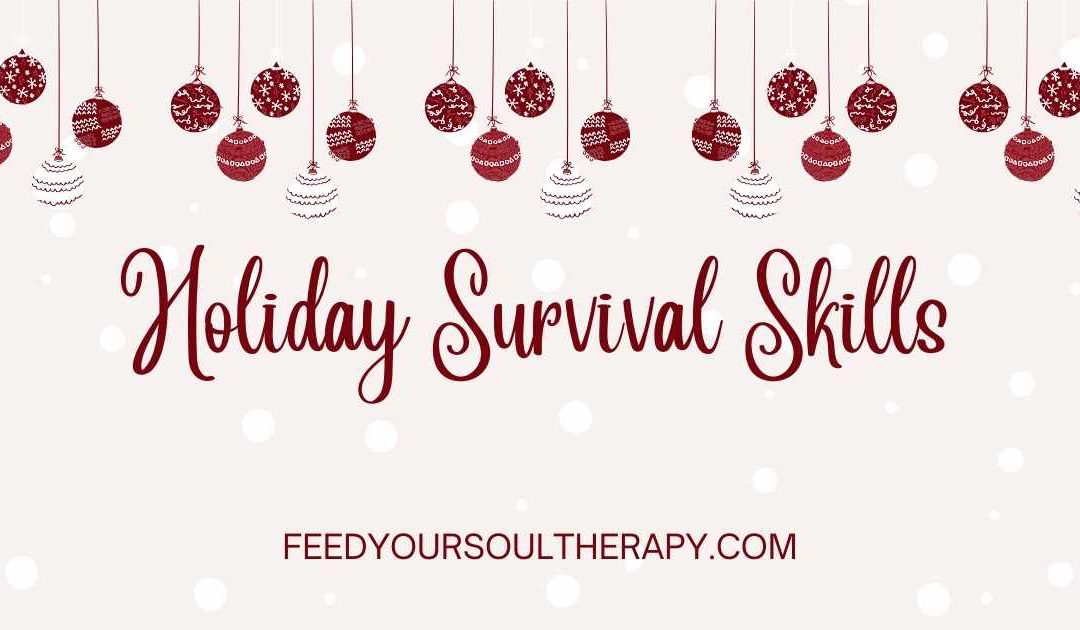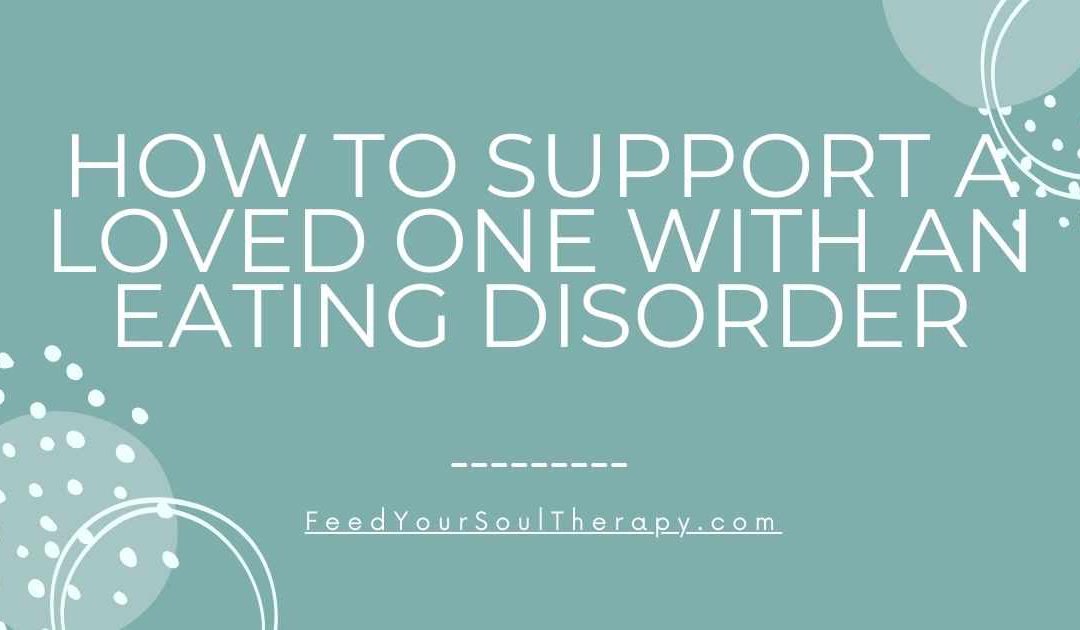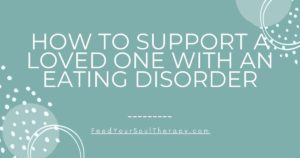
by KimMcLaughlin | Dec 17, 2024 | Eating Disorders, Holidays





Holiday survival skills are in demand as we navigate the busy and often stressful season.
Popular strategies being shared this year focus on maintaining physical health, managing emotions, and balancing social dynamics:
There are a lot of stressors whether you feel busy or not.
First, when we look at how to survive over the holidays determine how you will take care of your body.
Everyone knows it is important to take care of your body and that it can become complicated over the holiday season.
Here are some strategies to take care of your body this holiday season.
- Stay active in a way that works for you. Since it is the time of year when it is darker earlier, consider what activities you need to keep your body feeling good.
- Eat foodsthat work with your body. I like asking the question, what is your right food. Wonder to yourself if this food will give you the energy to do the things you need to do.
- Notice if you tend to try to restrict what you want to eat. This restriction can have the opposite effect and lead you towards binge eating. Recognizing there are special foods for this time of year can help you have the holiday foods that you want to have.
- Are you sleeping well or enough? Sleep is critical to your overall health. This time of year, we can have a varied sleep schedule due to activities. Look at how you can get your right amount of sleep.
Second, making sure you are focused on YOUR mental health and emotional wellness is a key to holiday survival.
The busy atmosphere can make us tend to override our mental health and emotional needs.
Try some strategies to help with keeping your emotional needs in mind.
- Acknowledging and addressing holiday-specific challenges, such as loneliness, grief, or dealing with family conflicts, can help maintain emotional well-being. These emotions can take a hold of us and affect how to maintain our balance.
- Try techniques like setting boundaries, practicing gratitude, or taking some space from others when you feel out of balance.
- If you feel too overwhelmed, seeking therapy can be helpful. Look for a qualified mental health therapist to help you if you are feeling down.
Third, evaluate what stress management skills you need for yourself this holiday season.
Here are some key tools to distress.
- Is your schedule overloaded? Try decluttering your schedule. What is your intention for this holiday season? What do YOU want to accomplish: rest, connecting with special people, taking a trip, or being active are some of the questions you can ask yourself.
- Evaluating what you need to let go of in your schedule can be valuable. You have permission to say no to people and activities that do not serve you this holiday.
- Prioritize your self-care can be life affirming. Ask yourself the question, what would bring me peace. What do you need to do for YOU? I ask myself these questions to help me practice more self-care.
- What is it you would like to do? Do you have a list of what you want to do this holiday season? I like using my Holiday Bucket list to determine my priorities
I write out my Holiday Bucket List every year. This is my list of what I want to do over the holiday season.
What are the things this holiday that you want to do? Here are some questions to guide you in the right direction.
- What foods you want to have?
- What foods do you want to make?
- What kind of activities would you like to do?
- Where would you like to go?
- What decorations do you want to put up.
- Do you desire some rest or more activities?
- What are crafts/decorating that bring you joy.
- Where would you like to go over this holiday season?
- What does this season mean to you and how can you embrace that?
- What are your spiritual needs? What can you do to support your spiritual needs.
I find it is helpful to take my list and put it in on my calendar.
Lastly look at the social and family dynamics playing out around you.
Determine what YOU need for yourself and preparing to ask for what you need can be critical.
- If you must manage challenging conversations- this can be the time to practice boundaries. I like coming up with my plan before the difficult conversation happens.
- Navigating differing values within families can be a concern over the holidays. It can be helpful to prepare your response to intrusive questions.
- I like planning neutral; inclusive activities can make gatherings smoother and there is less time for inappropriate statements from others.
- I like to pivot the conversation away from challenging topics, so I have some non-controversial topics prepared: weather, vacations, or sports.
- Being prepared to say, I don’t want to talk about this, is valuable. You can practice what you will say in advance. I like to ask the person bringing up a controversial topic- Why are you bringing this up? What is your intention? This helps you understand where they are coming from and set some limits.
- Who do you really want to spend time with? Who are the right people to spend time with? You deserve to spend time with people that are pleasant and enjoyable.
I encourage you to set yourself up for success. You are worthy of an enjoyable holiday.
Make this your time to connect with yourself and others that you truly care about.
Check out the Feed Your Soul with Kim Podcast where we talk about Holiday Survival Skills.
Kim McLaughlin, MA is a Psychotherapist, Speaker, Author, and Coach who specializes in working with people who suffer from binge eating and emotional eating. She is a Certified Intuitive Eating Counselor. She is the author of the best-selling book Feed Your Soul Nourish Your Life! A Six Step System to Peace with Food and the Amazon #1 Best Selling book Discovery Your Inspiration.
You can find Kim on her podcast Feed Your Soul with Kim and you can find it on all podcast platforms.
Wondering if you are an emotional eater? Sign up for the free Am I an Emotional Eater Quiz.

by KimMcLaughlin | Nov 15, 2024 | Eating Disorders, Mental Health





Eating disorders can be frustrating for loved ones to deal with.
Like schizophrenia and heart disease, eating disorders have a biological, psychological, and social component.
- Biologically, each has a genetic component and can run in families.
- Psychologically, they each are associated with other mental health factors.
- Socially, each has a history of stigma and public oppression.
Without treatment, eating disorder symptoms, like schizophrenia and heart disease, can progress over time. Each can cause long-term physical and psychological damage, if they are not addressed.
Comorbidity (the presence of 2 or more conditions) exists between eating disorder and other mental health conditions like anxiety, depression, obsessive-compulsive disorder or ADHD. There is a similar comorbidity with schizophrenia and substance use disorders and depression. Also, heart disease can coexist with depression and anxiety.
Therefore, overlapping diagnoses make treatment complex, because it often involves addressing multiple interrelated mental and physical health issues.
We know environmental factors like stress, trauma, and lifestyle can intensify symptoms of both schizophrenia and heart disease.
Eating disorders are also heavily influenced by societal pressures, stress and trauma.
Societal factors like body image ideals or personal trauma can act as triggers for disordered eating, just as stress or lifestyles can exacerbate schizophrenia and heart disease.
Eating disorders, like schizophrenia and heart disease, are often misunderstood by the public.
People can view them (eating disorders, schizophrenia, and heart disease) as something the person brought on themselves and as a function of moral failing where they have not “tried hard enough” to get better. This stigma is in large part the reason people do not want to seek help.
Often people will say, “why can’t you just control yourself and your eating.”
Treating eating disorders often requires a multidisciplinary approach, including medical, psychological, and nutritional treatment. Similarly, management of schizophrenia or heart disease requires a combination of medication, mental health therapy, family and lifestyle changes.
Eating disorders, like schizophrenia and heart disease are treatable (there is hope) it needs understanding treatment providers to assist the person to get better.
Since Eating Disorders are so complicated, how can you support a loved one who is struggling with an eating disorder?
First, you do not have to respond perfectly to your loved one with an eating disorder each time. Give yourself grace to not respond and forgive yourself for what you might have said and done in the past.
You are probably scared your loved one might die or be incapacitated. Your fear makes sense. It is hard to support someone who has an eating disorder, especially when you do not understand it.
I have talked to many loved ones who genuinely feel great love but feel frustrated that the person is not stopping their behavior. I empathize with your situation, and I can honestly say that letting go of your anger can be so helpful to you and your loved one.
Second, increase your constructive and positive communication skills.
This can be easier said than done when it is YOUR loved one that you must interact with. There are many communication skills that can help you.
Try to refrain from judgment.
Seek to understand where they are coming from. Move away from questions and comments that are shaming such as:
- Why did you do that?
- Why don’t you stop?
- What is wrong with you?
- Just eat.
- Don’t eat.
Ask your loved one to help you understand where they are coming from. Let them tell you, not you tell them. A good question is, “I feel confused, can you help me understand.”
When we seek to understand, we can then begin to come from a place of empathy for their situation.
Another great communication skill is active listening, where you listen deeply to what they say. It can be hard to listen when you feel frustrated, and active listening can help decrease the frustration.
Third, seek support for yourself to understand how this is affecting you. It is hard to help someone who has an eating disorder. You have learned a lot from the world about food, weight, and the value of dieting, making it difficult to push aside the societal expectations.
Ask for referrals for a therapist or counselor who can support you in this process.
The professional will be able to help you understand your feelings, thoughts, and reactions. They will be there for you, because when we have a loved one with an eating disorder it seems all the focus is on them. You can also be suffering and deserve a place to feel better.
Fourth, encourage your loved one to seek qualified professional help: a therapist or counselor who is specially trained to work with people with eating disorders.
The suggestion to seek professional help should come from a place of love.
Tell them you love them and are concerned about them.
If the person is talking about the problem, you can suggest they might want to talk to a professional about it. This can be a slow process, and they might say no. That is ok, this is on their timetable, not yours.
If your loved one says no, I encourage a family member to contact a mental health counselor or therapist who specializes in eating disorders to consult. When I, as the therapist, get these types of calls from loved ones, I listen to their situation and give them some non-shaming language to use to encourage the person to make the call.
Fifth, seek out support groups that offer education about eating disorders. Group members can provide their personal experiences about how they handled situations that may spark ideas for you. You can feel isolated being around a loved one with an eating disorder, so seek out others who are trying to eat through an intuitive eating and body positive lens.
Balance between offering support and respecting the autonomy of a loved one with an eating disorder.
There are different ways to respond to a person with an eating disorder based on what the eating disorder is AND how it is affecting their lives. There can be situations where the person is truly in a life-or-death situation. In that instance, work with treatment professionals to determine boundaries to take appropriate and immediate action.
When the eating disorder is not an immediate life-or-death situation, it is important to determine:
- The timing to offer support.
- When you need to give the person the space to make their own decisions.
- If you must set firm limits.
Determining when you offer support and when you respect their autonomy can be something you bring to your own mental health professional or treatment group.
In the end, I want anyone with an eating disorder reading this to know there is hope and there is help. Dealing with eating disorders is complicated and you might feel out of control. The first step can be to admit there is a problem and to ask for help
I know from experience your eating disorder can be treated. There is hope, there is help.
This article was initially published in full in Authority Magazine and Medium.com. Read the full article here: https://medium.com/authority-magazine/kim-mclaughlin-of-lmft-on-how-to-support-a-loved-one-who-is-struggling-with-an-eating-disorder-f5ecd2088ec3
You can find the article video here: https://youtu.be/awGrVXeCCYI
Kim McLaughlin, MA is a Psychotherapist, Speaker, Author, and Coach who specializes in working with people who suffer from binge eating and emotional eating. She is a Certified Intuitive Eating Counselor. She is the author of the best-selling book Feed Your Soul Nourish Your Life! A Six Step System to Peace with Food and the Amazon #1 Best Selling book Discovery Your Inspiration.
You can find Kim on her podcast Feed Your Soul with Kim and you can find it on all podcast platforms.
Wondering if you are an emotional eater? Sign up for the free Am I an Emotional Eater Quiz.






